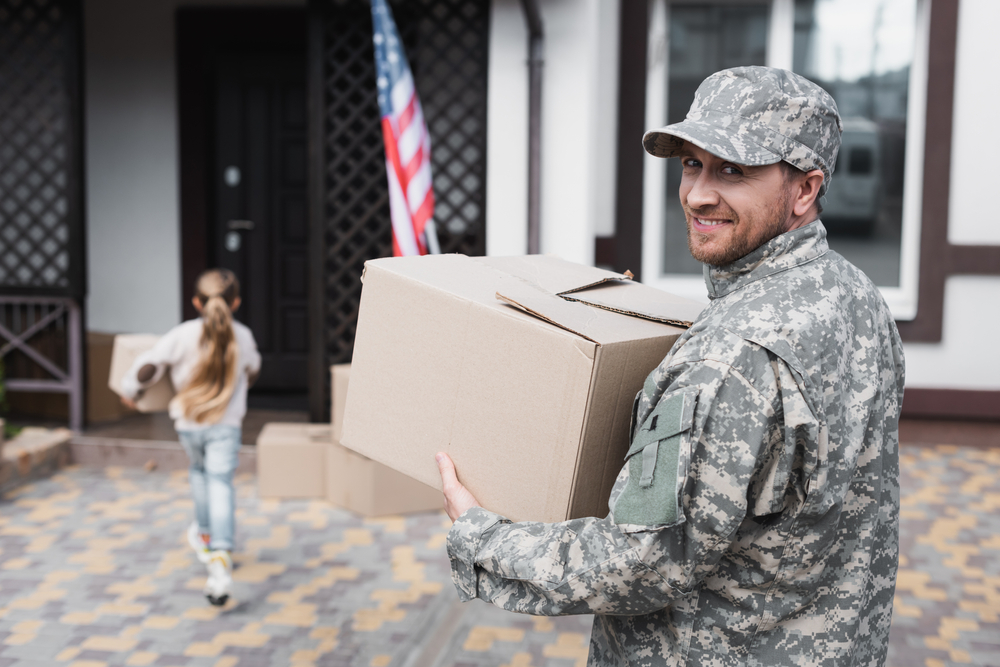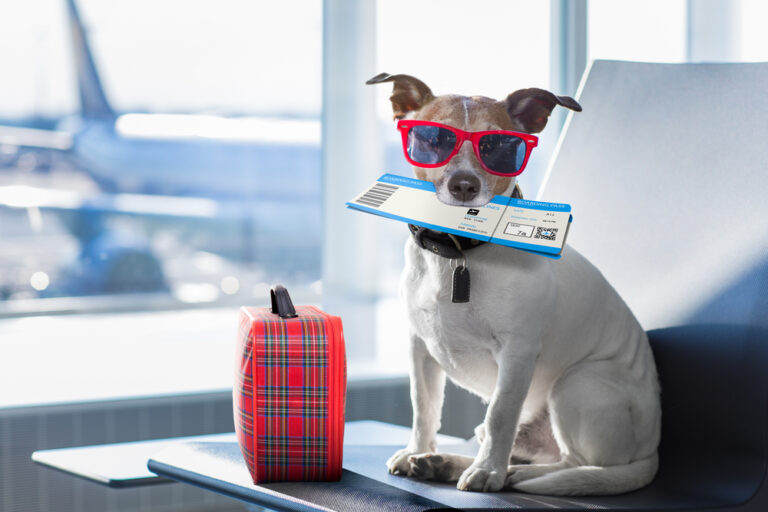Military families often move every two to three years, sometimes even more frequently. While relocation can be a great opportunity for career advancement and broadening experience, it’s almost always stressful. Packing your life in boxes and bags and moving to a new location can be hard, especially if you have children and pets.
This military moving guide will introduce you to 10 tips for military moving. We’ll explain in detail how to prepare for a military move and make the process much easier.
10 Tips for Military Moving You Should Know
These 10 tips for moving interstate and overseas will relieve some of the stress that comes with relocating.
Tip No. 1 – Start Planning When You Receive the Order
Many may hear rumors of an order and start planning the move. While planning months and months ahead may sound tempting, it can actually cause even more stress. Remember that most chores aren’t accomplished until a few months before the relocation.
Wait until you receive the official order to start planning. Most service members receive their orders several months before it’s time to move. This gives you enough time to plan everything. It’s also important to consider the time of year. If you’re moving during the peak period (May-August), it’s essential not to procrastinate.
Tip No. 2 – Create a Binder
Proper organization is key to making the moving process less stressful. Losing important documents is something you definitely don’t need. That’s why one of the best tips for military moving is to create a permanent change of station (PCS) binder. This binder should contain every important document, from birth certificates to powers of attorney, passports, mortgage documents, rental agreements, etc.
You can also keep packing checklists and calendar pages in the binder. Besides having everything in one place, the binder will help you feel more organized.
Tip No. 3 – Visit the Transportation Office
If this is your first time moving, it’s natural to have many questions and uncertainties. Make a list of the most important questions and visit your local Transportation Office. The employees will be able to give you accurate answers and inform you about your options for moving.
Don’t hesitate to ask something twice if you don’t understand it. Write down the answers so that you don’t forget them. Once you get home, add the paper to the binder we mentioned in the previous tip so that you have everything in one place.
Tip No. 4 – Go Online
Another way to manage your move better is to go online. There are many websites and blogs that contain information that could make the moving process much easier. You can contact fellow military personnel, ask them for recommendations and tips, check what paperwork you need, etc.
Tip No. 5 – Contact Base Family Services
Family service centers can provide useful relocation information, budgeting tips, employment opportunities, etc. Call your center to schedule an appointment, write down your questions, and speak to a relocation assistant.
Tip No. 6 – Research Your Base
Ideally, you can visit your installation before moving, but this may not be possible if the new base is too far. Fortunately, this doesn’t mean you can’t do any research before moving. Visit Military.com’s Base Guide, where you can learn more about the location you’re moving to, get contact information, etc.
If you have a sponsor, take advantage of having someone with first-hand information about your new base. A sponsor can help you prepare for the relocation and relieve some of the stress.
Tip No. 7 – Talk to Children
Moving to a new location is often much more stressful for children than adults. Ensure your children understand why they’re moving. If they’re old enough, it may be a good idea to engage them in the process. Get colorful moving labels and stickers and ask the children to decorate the boxes you’re taking with you.
If your children are too young, ask a family member or a close friend to babysit them while you’re packing and cleaning.
Tip No. 8 – Consider Pets
Moving to a different city, state, or continent can be so consuming that many forget about their pets. Namely, most moving companies won’t move pets. You’ll need to organize your pet’s transportation to your new duty station.
Before moving, ensure your pet is healthy and fully immunized. This is especially important if you want to transport the pet by plane. Remember that moving is a stressful period not just for you but also for your pets. Scared dogs and cats are more likely to run away when you least expect it. For this reason, it’s best to have a collar with an ID tag or a micro chip that makes it easier to be reunited with lost pets.
Tip No. 9 – Have a First-Day Box With You
A first-day box is a box where you’ll pack everything you’ll need as soon as you arrive at your new home. Instead of leaving it in the moving truck, take this box with you. The box’s content depends on your and your family’s needs, but it usually contains toilet paper, a change of clothes, diapers, snacks, etc.
Tip No. 10 – Be as Flexible as Possible
Expecting the unexpected often goes hand in hand with relocation . As much as we’d love it, not everything goes as planned. Delays and adjustments are often necessary and unavoidable, and if you want to make the most out of them, you have to be flexible.
If possible, try moving on less popular days. Traditionally, the worst periods are the last week of every month, especially during the busy season. The chances of getting the preferred dates increase if you can move mid-month.
What to Do Before Military Movers Come
If you’ve received the official PCS order, you’ll likely feel there’s no chance you’ll be able to get everything ready on time. These tips on how to prepare for a military move will help you be more efficient and complete the moving process with greater ease.
Get Rid of the Stuff You Don’t Need
Your house “gains weight” over time. If you’ve lived in the same house for a few years, you’re bound to stumble upon stuff you don’t really use. Relocation is an excellent opportunity to get rid of such belongings. Think about how many of the things inside your house you want to unpack in your new home.
Get rid of things that are broken or worn out. Of course, there’s no need to throw away everything. You can always donate to charity or organize a garage sale and even make some money in the process. If you don’t have time for a garage sale, you can ask a someone you trust to sell the items for you on the internet.
Wash, Wash, Wash
Although stressful, relocation is an excellent way to get a fresh start, and a fresh start deserves fresh, clean things. About a month before the move, start washing everything you want to take with you. Besides clothes, focus on curtains, sheets, towels, pillowcases, etc.
Find a designated area for storing the clean items until they need to be packed.
Do Inventory With Your Camera
Keeping track of all your belongings during the moving process can be quite challenging, if not impossible. Instead of writing down how many spoons, forks, and knives you have, you can use the camera on your phone. Simply open your cabinets and take pictures. After moving into your new home, use the pictures to check whether everything’s there.
Use Ziplocs
If you want to keep your spoons, forks, and knives in one place and avoid re-sorting them after moving into the new house, it may be a good idea to place them in Ziploc bags. Moreover, you can use Ziplocs for curtain rings, spices, markers, pens, hardware, etc.
Take a Picture of the Back of Your TV and Computer
Remembering which cables are plugged into your electronic devices can be challenging. Fortunately, there’s no need to worry about this when you can take a picture of the back. That way, you’ll know which cable goes where.
Get Rid of Liquids
Military moving companies don’t move liquids and chemicals, so you may end up with a stack of detergents, cleaning supplies, and beauty products. To avoid unnecessary expenses or dragging the liquid products with you in the car, it’s important to plan ahead.
In the months before you move, pay attention to how you use the liquid products in your home and don’t buy new ones unless you absolutely have to. Moreover, you can switch to powder forms of detergents and solid shampoos and shower gels in this period.
Get Rid of the Boxes From Your Previous Move
Military families move frequently. If you’ve moved in the past and still have unpacked boxes from your previous move, it’s likely you don’t need the stuff. Double-check the boxes and get rid of them. Donate the stuff to charity, give it to thrift shops, or throw it in the dumpster. Decluttering is one of the best ways to prepare for moving and ensure you don’t exceed the overall household goods weight.
Divide and Conquer
Cleaning the house with children can be fun, depending on their age. But, in most cases, cleaning with small children is an added stress you don’t need. If you want to be efficient, it’s best to divide and conquer. One partner can take the kids and pets out while the other cleans the house. You and your partner can switch off during the day.
Hire a Cleaning Agency
Although it’s an added expense, hiring a cleaning agency can significantly reduce the stress of relocating. Professional cleaners can ensure your house is spotless while you do other chores.
Take Breaks
Moving can be overwhelming. That’s why it’s essential to remember to take breaks. Even if it’s just for a few minutes, a break can help you clear your mind and relax. Ideally, take a walk with your family, go out to eat, and forget about the stress for a while. You’ll recharge your batteries and feel refreshed.
What Will Military Movers Not Pack?
Military movers come to your house, pack your belongings, load them onto the truck, and transport them to your destination. However, there are certain things military movers won’t pack. This is often related to liability; anything that could potentially damage your belongings during transportation makes the military movers liable. If you need to move such things, you’ll need to organize the transportation yourself.
Vehicles
Transporting cars, boats, trucks, trailers, and motorcycles typically requires a specialized military moving company. Keep in mind that not all companies are willing to work with such heavy objects. Moreover, the cost of transporting a vehicle to a new location is often not part of the military move package.
Pets
Military movers will not pack pets (at least not knowingly). Regardless of whether you have fish, hamsters, cats, or dogs, they can’t go with the movers. That being said, movers will gladly take a hamster cage or an aquarium, provided they are empty and dry.
Ensure your animals are in a safe environment before the movers come to pack your belongings. Many animals suffer stress while the movers are working and can hide inside the house or even find a way out. Keeping them in a secure, confined area is the best way to ensure everyone’s safety.
Construction Material
If you’re a handyman, you probably have a collection of construction materials in your garage. Unfortunately, most military moving companies won’t pack and transport such material.
Ammunition
While some military movers will pack your guns, ammunition is not on the list of allowed items.
Cleaning Supplies
Cleaning supplies can easily spill during transportation and damage your belongings, so most military movers don’t pack them.
Batteries
Most military moving companies will not pack and transport batteries as they can leak, explode, and cause serious damage.
Chemicals
Chemicals for treating spas and pools, bleach, chlorine, and disinfectants are something most military movers avoid working with. The reason is the same as with other items on the list; these chemicals can damage your belongings.
Specific Food and Spices
Military movers will pack food products in their original packaging with a proper seal. However, most movers will set aside food with no seal, frozen food, and spices.
Keep in mind that this list isn’t universal for all military moving companies. Some companies may be able to pack and transport some of the items on this list.
Let Military Movers Help
Whether it’s interstate or overseas, moving is never easy. Packing your belongings and starting your life in a new location can be overwhelming, even for those who have done it in the past. Organizing the packing, labeling the boxes, and finding transportation can be frustrating and stressful.
Fortunately, you don’t have to go through the process alone. Military movers will pack your belongings and transport them to your new address safely and efficiently. If you’re interested in our services, feel free to reach out to us. Even if you decide to do it on your own, we hope this military moving guide has helped you prepare for moving and handle the process successfully.







